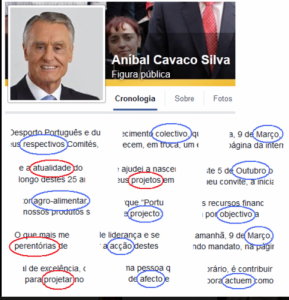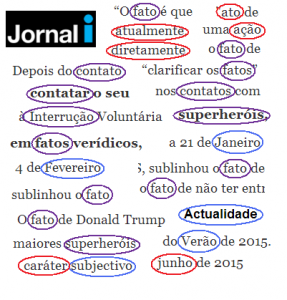By Sarah-Claire Jordan

Portuguese President’s website showing numerous errors. Portuguese state websites are the ones showing the most errors.
Even before the French language committee had announced that there will be spelling changes implemented for around 2,400 French words, Portugal led the way in 1990 with a proposal to make Portuguese spelling more uniform across the different countries that speak it. This meant essentially favoring the Brazilian pronunciation and spelling of words, rather than the more traditional Portuguese spelling.
The part where this all gets more interesting is when you realize that this was not an agreement put forth by any sort of language committee, as is the case with the French spelling reform. This is an international treaty between the different Portuguese-speaking countries that was proposed by Brazil and has so far only been ratified by Portugal and Brazil. In that sense, given that it hasn’t been ratified and accepted by six of the other Portuguese-speaking countries, there is no legal basis to enforce any of these changes.
In Portugal, the newspapers and other media have been the first to take steps to implement these changes. They include the removal of certain consonants, such as “p” and “c”, when they are silent, plus the addition of the letters “k”, “w”, and “y” to the Portuguese alphabet, making it 26 letters instead of 23. There are also some new rules regarding accents, such as the removal of the diaeresis mark (as in “ü”) from the language.

Newspaper after they adopted the new rules: red: new spelling, blue: old spelling, purple: neither: the writer created his own spelling…
The reasons behind the reform are a bit unclear, but the consensus seems to be that Brazil has become such a huge power in the Portuguese-speaking world, and thus can afford to ask for these kinds of changes. Supporters in Portugal believe the changes will affect trade relationships between the Portuguese-speaking countries and open up new markets in Brazil. Critics of the reform believe this is a purely political decision that was approved in Portugal by a corrupt prime minister, so there could be some money being handed back and forth.
A major problem right now is the dissonance between how the media and how other entities, such as schools, are taking the reforms. A famous newspaper in Portugal was the first to adopt the changes, but the results were a bit horrifying, as the texts were a mixture of old spelling, new spelling, and spelling that doesn’t exist. In other cases, the old and new spelling coexist in the same text, which is very confusing as there are basically two or more accepted ways to spell many words in Portuguese now.
Spelling rules imply that some words will now have two accepted forms of spelling, with the current spelling still being perfectly acceptable. However, we believe that, with time, the new spelling will be commonly accepted and used.
For the sake of terminology and style harmonization with past translations, Alpha Omega Translations will not be implementing these new, controversial spellings immediately. Progressive adaptations will, however, be implemented to adapt to on-going language trends and future usage as we think that language is a living organism that cannot be set in stone.
Throughout history, languages were born, started growing with time, and in some cases gave birth to different dialects or experienced death. Language has its own life. It develops depending on the environment it was born in, demonstrating to be unique in its sound system, spelling, vocabulary, and system of grammar. We are therefore committed to follow the trend and new rules.



